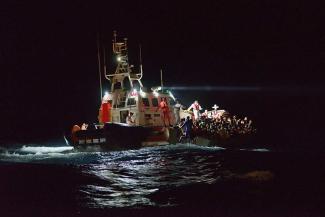European Union
EU strengthens borders against refugees
 picture-alliance/Daniel Kubirski
Italian Coast Guard rescuing refugees in the central Mediterranean.
picture-alliance/Daniel Kubirski
Italian Coast Guard rescuing refugees in the central Mediterranean.
After a few comparatively quiet years, the route from North Africa and Turkey across the Mediterranean has once again become very busy. In 2022, according to the EU, more than 90,000 migrants arrived via the central Mediterranean route. That was over 50 % more than in 2021.
In response, scepticism towards migration is growing in the EU. In January 2023, the EU Commission unveiled a strategy to significantly increase the number of migrants who are sent back to their countries of origin because they do not have the right to stay in the EU. In recent years, the EU tried to increase the repatriation rate by motivating people to return voluntarily. Now, the EU seems to be keen on closer cooperation with the authorities of its member states.
Frontex, the European border-control and coast-guard agency, is affected directly. It is in charge of monitoring the EU’s external borders. It operates at sea, on land and in the air. Since its launch in 2005, it has, among other things, provided support for EU member states’ management of the EU borders. It also maintains relations with third countries with an eye to enforcing the repatriation of persons obliged to leave the EU. In light of growing migration flows, Frontex’ duties are increasingly important.
Strengthening Frontex
In 2019, the EU extended Frontex’s mandate. Regulation (EU) 2019/1896 gave the agency the power to carry out border checks and register migrants. It also gave a green light to the development of a “standing corps” of 10,000 border guards. It is to be set up by 2027. Its staff will include officers of Frontex as well the member states.
It is similarly important that cooperation with third countries is changing. Frontex is now allowed to assist certain countries with border-related tasks anywhere on their territory, not just in areas bordering the EU. Such an agreement with the Republic of Moldova, for example, took force on 1 November 2022. Northern Macedonia followed suit on 1 April 2023. The EU wants to discuss similar agreements with Mauritania and Senegal.
Effects of the Dublin system
Some of Europe’s current border management problems are rooted in the so-called Dublin system. It is named after the “Dublin III Regulation” which applies in all EU member states as well as Switzerland, Norway, Liechtenstein and Iceland. The system is designed to ensure that any asylum application filed in the EU will only be examined once. When a person crosses a border without the required documents, the state concerned is examining the application for protection.
Particularly large numbers of refugees arrive in countries on the Mediterranean Sea, especially Italy, Greece, Spain and Malta. Under the Dublin system, their authorities are responsible for registering the arrivals. That entails administrative effort and expenses.
To avoid this burden or at least reduce it, the national governments have two options: One is to prevent refugees from reaching their shores, which can result in increasingly drastic action by border agencies. The other is to forgo official procedures, and transporting refugees, as soon as they arrive, to other EU states or at least allowing them to travel there. This is called “secondary migration”.
Other EU members have repeatedly volunteered to help their Mediterranean partners by taking in refugees or supporting them financially. However, the EU has not been able to agree on binding rules regarding the fair distribution of refugees. Countries that are particularly hard hit by illegal migration thus increasingly act on their own.
Tighter regulations
Italy, for example, is making civilian rescue operations on the Mediterranean more difficult by adopting legislation that is questionable under international law. Italy forces ships that have rescued people from distress to head for an assigned port immediately; they are not allowed to provide assistance to other boats in distress, even if they are nearby. The rescued persons must be asked to fill in asylum applications on board of the ship and indicate in which EU country they wish to get protection. If rescue teams fail to observe these rules, they face heavy fines. Vessels may be confiscated.
Moreover, ships that do arrive in European ports with rescued migrants can be detained for weeks or even months. The fugitives concerned are thus often left to themselves in destitution. The cruel calculation is: the fewer people step ashore, the less administrative work looms.
EU citizens have become used to horrific images of refugees and stranded migrants. Right-wing populists fan fears with the narrative of governments implementing plans for “ethnic replacement”. They want people to believe that a “blocco navale”, a naval blockade of North African shores is the obvious solution to all problems.
Frontex is currently both part of the solution and part of the problem. A coast guard can only fight the symptoms, but not the causes of displacement. The agency’s budget is growing, it is getting more equipment and its jurisdiction has been expanded. This trend raises concerns that the scope for humane treatment of refugees and migrants is narrowing.
The humanitarian situation is tense. It can only be eased if the Mediterranean EU members have a strong say in defining solutions. Instead of criticising the way these countries are dealing with migrants, the EU and less-affected member states should do more in support of their disproportionately burdened neighbours. For example, they should help them to cope with the huge financial and humanitarian tasks.
Literature
Regulation (EU) 2019/1896:
https://eur-lex.europa.eu/legal-content/EN/TXT/PDF/?uri=CELEX:32019R1896
Dublin III Regulation (Regulation (EU) No 604/2013):
https://eur-lex.europa.eu/legal-content/EN/TXT/PDF/?uri=CELEX:32013R0604
Oliver Harry Gerson is a research associate at the Chair of German, European and International Criminal Law at the University of Passau.
oliver.gerson@uni-passau.de


